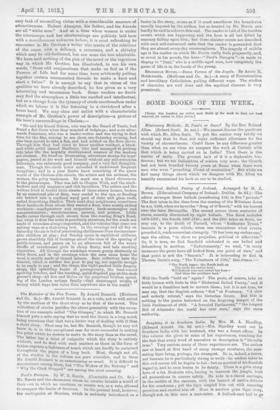Historical Ballad Poetry of Ireland. Arranged by M. J. Brown.
(Educational Company of Ireland : Dublin. 8s. 6d.)—The editor arranges these ballads (numbering 114) in five " periods.' The first takes in the time front the coming of the Milesians down to A.D. 1166, when we have the " Song of O'Ruark," with his lament over the false Devergilla. The second covers three centuries of storm, scantily illustrated by eight ballads. The third includes 1478-1607; the fourth 1607-17951 and the fifth takes us down, we may say, to tho death of Parnell, whom "Katharine Tynan" laments in a poem which, when one remembers what events preceded it, reads somewhat strangely. "It has been my endeavour,' says the editor, "to show no prejudice, political or otherwise." So, it is true, we find Sarsfield celebrated in one ballad and Schomberg in another. " Unfortunately," we read, " in many instances the poets rave all looked from one point of view," and that point is not the "Saxon's." It is interesting to find in Thomas Davis's song, "Tho Volunteers of 1782," this stanza :— " The North began: the North held on The strife for native land ;
Till Ireland rose and cowed her foes— God bless the northern land."
Will the North "hold on" again ? Tho poets, of course, take no little licence with facts in this " Historical Ballad Poetry," and it would be a thankless task to correct them ; but it is not true, we may say, that the English column " fled " at Fontenoy. "A slow and orderly retreat," says the historian Green. But this is nothing to the praise bestowed on the forgiving temper of the Irish Parliament of 1609. "A frenzied Parliament," " the longest Bill of Attainder the world has over seen," says the same authority.






































 Previous page
Previous page